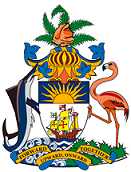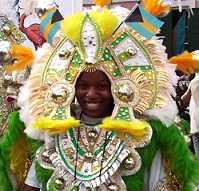|
The Feel-Good Guide to Sports, Travel, Shopping & Entertainment
|
| Main | Sports Events | Holidays & Observances | Pop Culture | Shopping | Travel |
| MAIN
This year -- on Wednesday, July 10, 2024 -- it remains a celebration not to be missed! Like many areas in the Caribbean, the hundreds of islands and cays that make up the Bahamas were "discovered" and claimed by European explorers in the late 1400s. The road back to independence and self rule was long but relatively peaceful. The centuries in between explain why the culture and people of the Bahamas are rich with native Caribbean, European and African influences.
The first settlers on many of the islands were thought to be predominantly the Arawak speaking Lucayan or Taino people. They arrived from South America sometime in the 9th Century. For hundreds of years the indigenous culture thrived and spread from island to island. In 1492, Columbus landed at San Salvador and claimed the Caribbean islands for the Spanish on his first journey to the Americas. (The word Bahamas is thought to come from the Arawak name for the islands, but some historians believe it comes from the Spanish, "Baja Mar," which means "shallow sea.")
When the Spain controlled the islands, African slaves were brought to work in the plantation fields or in the homes of the plantation owners and other wealthy Spaniards. Most of the original population disappeared through fighting and diseases brought to the islands by the new African and Spanish inhabitants. Dutch rule followed when they gained control of the islands for a short time, but then lost them to the English in 1670. The Bahamas remained mainly under British rule for the next 300 years. The abolishment of slavery in 1838 marked the first beginnings of independence when many former slaves remained to work the land and eventually became land owners themselves.
Although all residents of the Bahamas were free, the Islands remained a colony of the United Kingdom. But much of day-to-day governing of the country was actually based in the Bahamas. This became a major factor that led to a peaceful negotiation for Bahama's independence. In 1964, after decades of debate and legal maneuvering, Great Britain granted The Islands Of The Bahamas limited self-government. In 1969, the Bahamas finally became a British Commonwealth, which effectively ended colonial rule. Four years later, the Bahama Islands gained total independence from Great Britain and became a sovereign nation on July 10, 1973.
Today, the big day is celebrated with a 10-day celebration beginning around July 1 leading up to the official Independence Day on July 10. The full roster of events traditionally include colorful float parades, musical performances, and special church services to mark the occasion. A mix of traditional Junkanoo performances -- and lots of fireworks displays --- are a highlight of the celebrations, punctuated with official speeches celebrating freedom and independence throughout the islands.
Have fun!
All About Junkanoo - A link to some pictures of costumes adds depth to this brief history of the junkanoo from Geographia.com.
|



